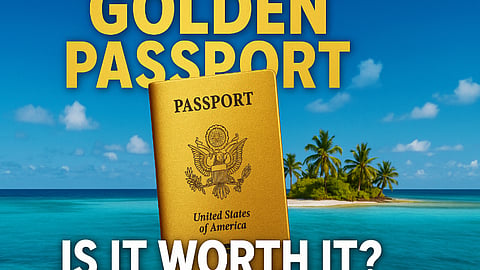Golden Passports: Why More Americans Are Buying Caribbean Citizenship
The Luxury of Plan B: A New American Dream
Once a niche strategy for international business moguls and crypto-rich nomads, the concept of securing a second passport has become a trending move among affluent Americans. And not just any second passport—a Caribbean one. With their lush landscapes, tax incentives, and visa-free access to global destinations, nations like Antigua, Dominica, and Grenada are rolling out the welcome mat through Citizenship by Investment (CBI) programs.
These legal frameworks offer full dual citizenship, often without requiring relocation, in exchange for financial investments starting around $100,000. For many Americans, this isn't about island-hopping or beach bumming—it's about hedging against domestic chaos. In the face of increasing political tension, economic instability, and global insecurity, these so-called "Golden Passports" offer the ultimate luxury: choice. And in today’s world, the ability to choose your jurisdiction, your tax system, and your future might just be the highest form of freedom money can buy.
Second Passport for American Investors: What You Get for Your Money
In a world where security and mobility are growing concerns, Caribbean citizenship by investment is increasingly framed as a wise insurance policy. These programs, available in countries such as Antigua and Barbuda, Saint Lucia, Grenada, Saint Kitts and Nevis, and Dominica, allow investors to obtain citizenship for relatively modest contributions—compared to European equivalents. Typically, an applicant contributes to a national development fund or purchases pre-approved real estate.
Unlike in Europe, there's generally no requirement to live in the country or learn a new language. What makes these passports so appealing is the access they unlock. Depending on the nation, they offer visa-free travel to between 140 and 160 countries, including the EU Schengen Area, the United Kingdom, and Hong Kong. That means fewer visa hassles, less scrutiny, and more global autonomy. For high-net-worth individuals, it’s a streamlined path to global access—and potentially, more favorable tax structures to protect wealth from overreaching bureaucracies back home.
Why U.S. Citizens Are Flocking to the Caribbean
Not long ago, Americans didn’t rank among the top applicants for citizenship by investment programs. But something changed. In just the last few years, migration firms have reported triple-digit increases in inquiries from U.S. clients. Henley & Partners, a leading advisory firm in the space, logged a 500% increase in American inquiries between 2019 and 2023. One luxury realtor in Antigua even claims that 99% of her buyers are now American. The motivation is clear: U.S. citizens are feeling uncertain about the future. The country’s political divide is deepening, economic inequality is growing, and trust in institutions is at a low.
Against this backdrop, a second citizenship functions less like an indulgence and more like a strategic asset. It’s a way to secure personal freedom, protect assets, and escape the confines of a singular national identity. In effect, Americans are buying options—and the ability to exit if the temperature at home gets too hot.
Host Countries Reap the Benefits—With a Few Caveats
For the Caribbean nations offering these passports, the benefits are tangible. Citizenship by investment programs have become vital lifelines, especially for small island nations vulnerable to natural disasters and global economic shifts.
In Grenada, for example, revenue from CBI programs accounted for more than 25% of GDP in 2023. Dominica used the funds to rebuild climate-resilient infrastructure after Hurricane Maria. Saint Kitts and Nevis has seen similar gains, using CBI to fuel development and tourism. But while the programs support national progress, they’re not without controversy. Critics cite the potential for corruption, lax due diligence, and geopolitical pushback.
In 2023, the UK revoked visa-free access for Dominica, citing concerns about program abuse. The EU is also reassessing agreements with nations offering CBI. These programs walk a tightrope—balancing economic lifeblood with reputational risk. Yet for now, the Caribbean continues to ride the golden wave, offering a win-win model—at least, when implemented with transparency and integrity.
Not Just a Trend—A Global Identity Shift
The appetite for dual citizenship represents something more profound than luxury escapism or tax optimization. It’s part of a larger shift in how individuals—particularly the wealthy—perceive identity, mobility, and sovereignty. A second passport symbolizes control in an era where people feel increasingly powerless. It's about diversifying not just one’s portfolio, but one’s legal and geopolitical exposure.
The rise of these programs underscores a global rebalancing: as traditional powers wrestle with internal discontent, smaller nations are carving out competitive advantages. Caribbean states, long overlooked, are now centers of diplomatic, fiscal, and lifestyle opportunity. Americans, once proudly mononational, are now seeking flexibility once reserved for the globally elite. This isn’t just about tax havens or vacation homes—it’s about security, dignity, and self-determination. And while golden passports may not solve the world’s ills, they provide a compelling answer to a growing question: what’s your Plan B?
Inspired by what you read?
Get more stories like this—plus exclusive guides and resident recommendations—delivered to your inbox. Subscribe to our exclusive newsletter
Resident may include affiliate links or sponsored content in our features. These partnerships support our publication and allow us to continue sharing stories and recommendations with our readers.

